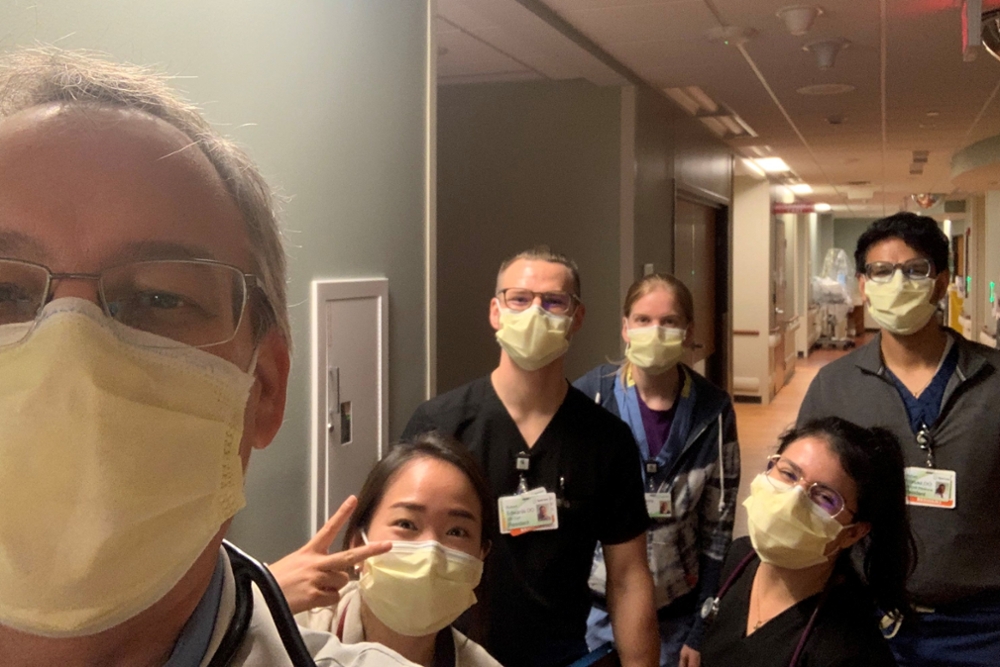Dean's Update
October 29, 2021 - Aron Sousa, MD
Friends,
This week and last, I have been rounding with the internal medicine teams. Anyone who knows me knows how much I enjoy my time as an attending on the MSU internal medicine service. (Pictured L-R: Aron; Heesoo Yoo, PGY-1 internal medicine; Robert Edwards, PGY-1 ob/gyn; Chelsea Rawe, PGY-1 psychiatry; Valery Rozen, CHM MS2; and our stalwart senior resident who runs the service, Rohan Prasad.)
 This fortnight, there has been COVID-19 to be sure, although not as much as when I was on last April at the height of the state’s spring surge. Back then, the majority of COVID-19 care was about the respiratory disease complicated by inflammation, delirium, and vascular complications. That is still how I would characterize our care of unvaccinated patients with COVID-19.
This fortnight, there has been COVID-19 to be sure, although not as much as when I was on last April at the height of the state’s spring surge. Back then, the majority of COVID-19 care was about the respiratory disease complicated by inflammation, delirium, and vascular complications. That is still how I would characterize our care of unvaccinated patients with COVID-19.
Now, however, there is a group of people who have COVID-19 for a second time or were vaccinated, and the care of these COVID-19 patients includes more management of underlying health problems exacerbated by being sick with COVID-19. For these patients, respiratory symptoms may still be there, but we are struggling more with their underlying health issues like kidney disease, or heart problems, or their auto-immune disease.
As of Wednesday this week, both the FDA and the CDC have approved COVID-19 booster vaccinations for Pfizer, Moderna, and Johnson & Johnson vaccines. The CDC has a PowerPoint of supporting data with some interesting graphs showing reductions in vaccine effectiveness over time to justify the boosters. Interestingly, people can now mix and match boosters, and there is reason to believe that changing to a different vaccine booster may increase your antibody response. (There is not much data on the clinical impact of this strategy.)
Vaccinations for children 5-12 years old have been approved by the scientific panel of the FDA, and we can expect an FDA emergency use authorization in the coming days. This was the subject of today’s Town Hall, which was available across all colleges and can be seen on the College of Human Medicine website for Town Halls. Dr. Keith English, chair of Pediatrics and Human Development, and I answered about 57 questions – Keith was great and people had wonderful questions!
Since my last update, the LCME approved our application for an eighth campus based at Henry Ford Hospital beginning with the next academic year. This means our current MS2s will be considering Henry Ford as they do community assignments in the next couple of months. We introduced our new Community Assistant Dean, Eileen Hug, DO, at a Town Hall three weeks ago. This is very exciting progress and puts us about one year ahead of schedule! My deep thanks to Dianne Wagner, Carol Parker, Robin DeMuth, Eileen Hug, and the entirety of the College of Human Medicine and Henry Ford teams for this impressive accomplishment!
Two years ago this week, I began my second stint as interim dean of the College of Human Medicine. In that time, the people of the college have done so much great work that I cannot fairly recount it all. Our patients have benefitted from some of the best medical care available. And, our educational teams revised curricula to address the pandemic and social distancing for students, sometimes overnight. Perhaps most importantly, our medical students were able to get back with patients sooner than the vast majority of medical schools because of our great faculty and community partners.
Our research teams have been similarly astonishing during the pandemic. Grant numbers and dollars continue to increase, and many people have managed to continue publishing using existing data. We all know that much of this productivity was work done on stolen time, and we have to get back to something more sustainable for the future. I am so grateful for the work of our researchers and, especially, their teams.
Grants and grant dollars are an important part of how we pay the bills, expand faculty, and advance our work, but in the end, the whole point of scholarship is to have an impact on the world. Sometimes that impact is through particular discoveries or analysis, but often our most important work is as public intellectuals helping our communities understand science and the place of science in decision making.
Over the last two years, I was heartened to see our students and faculty speaking and writing for public sphere about science and COVID. The last several years have demonstrated that our scholarship is not just about discovery or advancing a discipline. Our scholarship should have an impact on how society thinks about health and science.
A key part of the work a great medical school does is the public advocacy of advancing our disciplines through our scientific and analytical efforts. Because of our community partnerships and our broad disciplinary base, our college is uniquely positioned to lead national conversations about integrating public health and medicine, advancing community care, and supporting the medically underserved everywhere. This is good work we all can do to help those around us.
Serving the people with you,
Aron
Aron Sousa, MD
Interim Dean

